Challenging Dominant Narratives: Alexandra Cenatus, James Yékú, and Kristen Mapes
Overview
These three presentations will examine how digital humanities can both challenge dominant narratives and create space for marginalized voices. Together, the talks invite attendees to consider how DH projects navigate questions of migration, community, representation, and power, while also addressing with the challenges scholars face in access, infrastructure, and knowledge production. By engaging with these case studies, attendees will gain insight into how digital humanities can serve as a tool for constructing counter-narratives, fostering ethical collaboration, and reimagining the cultural record across borders.
The Haitian American Dream Timeline: Constructing Counter-Narratives Through Digital Humanities
Presented by Alexandra Cenatus, Ph.D. Student and Humanities Program Director, University of Maryland, Baltimore County
October 23, 2025
This presentation discusses the Haitian American Dream Timeline, a collaborative digital humanities project that examines the complex history of Haitian immigrants in the United States. Drawing from Michel-Rolph Trouillot’s (2015) perspectives for documenting both historical actors and sites of historical production, this project traces the causes behind various periods of Haitian migration. This project employs scavenging approaches to construct counter-narratives that center Haitian voices and experiences while providing historical and political contexts that drive migration patterns from Haiti to the United States.
The presentation will also address the barriers that Haitian scholars face when attempting to access archives and conduct research, examining how their positionalities and perspectives shape the narratives they produce about Haiti and its diaspora. Through this analysis, it will demonstrate how digital humanities can serve as a tool for amplifying marginalized voices and creating more nuanced narratives, disrupting archival practices. By sharing both the successes and obstacles encountered in this project, it offers strategies for other scholars working on producing counter-narratives in their digital humanities work.
Register Here: https://utsa.zoom.us/meeting/register/RYhrrlstQuOsM5eW59oSlQ
https://www.youtube.com/@TransborderDH
Watch the Presentation
Join us for a conversation on the Haitian American Dream Timeline, a collaborative digital humanities project that explores the histories and forces shaping Haitian migration to the United States. This presentation centers Haitian voices while examining how political and historical contexts influence migration patterns, and it reflects on the challenges Haitian scholars face in accessing archives and producing knowledge. By sharing insights from this project, the talk highlights digital humanities as a tool for creating counter-narratives and amplifying marginalized perspectives.
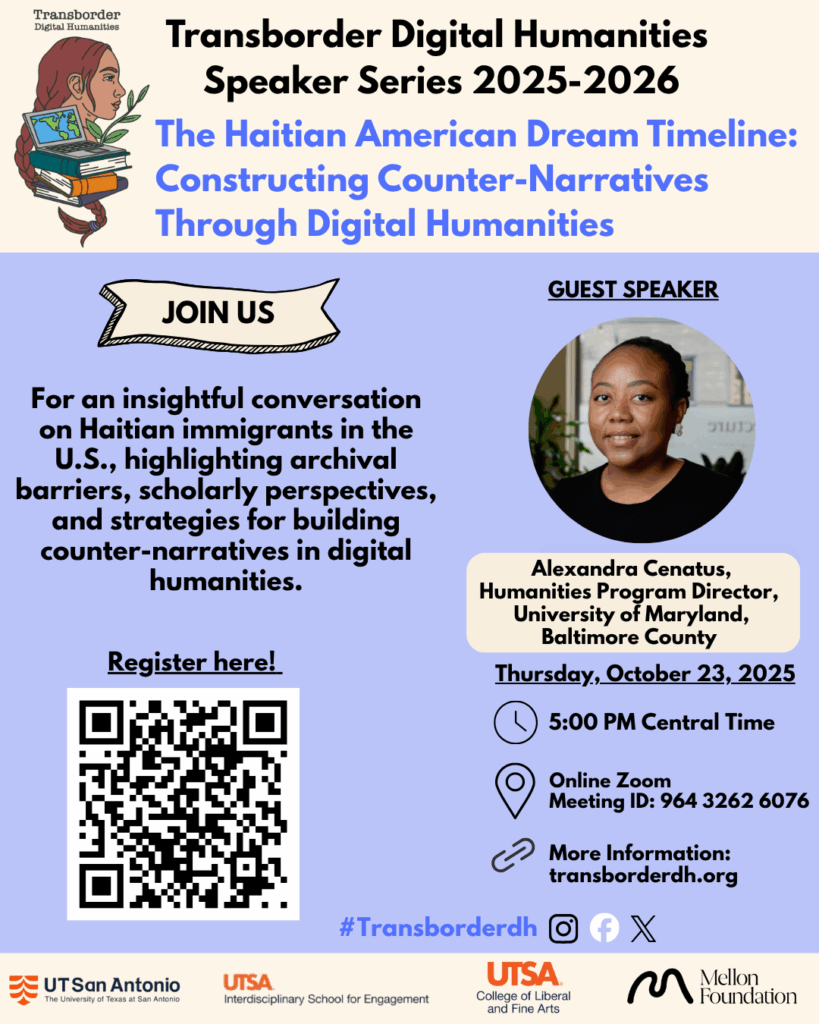
Crossing Digital Borders: DH in Africa, Africa in DH
Presented by Dr. James Yékú, Associate Professor of African DH and Co-Creator of African DH Symposium, University of Kansas, Lawrence Kansas
October 30, 2025
In this talk, I argue that African digital humanities (DH) is fundamentally a border-crossing intervention, with its transnational ontology shaped by the conscious platformization of African voices and projects within digital humanities. Drawing on African DH initiatives at the University of Kansas, I will highlight the importance of postcolonial and African theoretical approaches to the digital cultural record, discuss the politics of digital representation and knowledge production in DH, and address recent concerns about African data and AI models. My goal is to explore how community plays a foundational role in shaping African DH and to argue that ethical collaborations provide a more resilient framework for DH work, effectively “trumping” the common constraints of funding and infrastructure.
Register Here: https://utsa.zoom.us/meeting/register/dfSsPYtHRauL4sArcWuBhA
https://www.youtube.com/@TransborderDH
Watch the Presentation
Join us for a talk that examines African digital humanities as a border-crossing intervention shaped by transnational collaboration and the platformization of African voices. Drawing on African DH initiatives at the University of Kansas, this presentation explores postcolonial approaches to digital cultural records, the politics of representation and knowledge production, and emerging concerns around African data and AI. Centering community and ethical collaboration, the talk argues that collective, community-driven frameworks offer more resilient and sustainable models for digital humanities work.
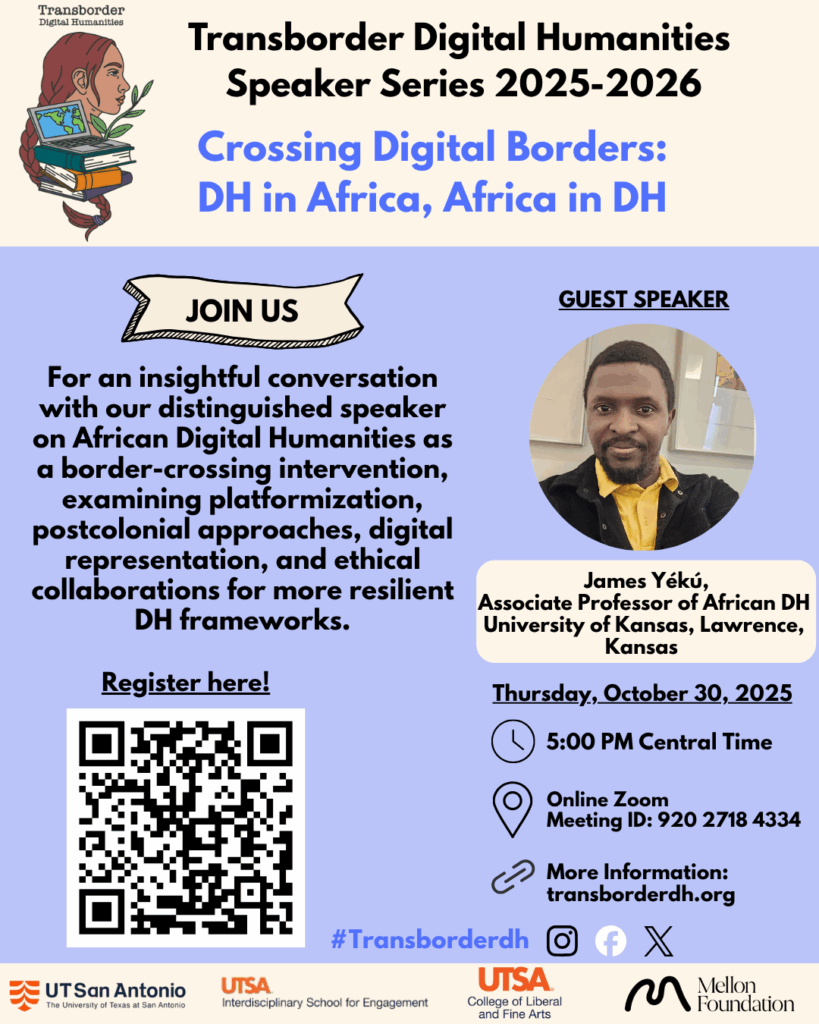
What is Global Digital Humanities? Reflecting on Opportunities and Challenges
Presented by Kristen Mapes, Interim Director of Global Digital Humanities, Michigan State University, East Lansing, Michigan
November 7, 2025
This presentation will share the framework and theoretical underpinnings of the Global Digital Humanities Symposium as well as a behind-the-scenes look into how the event operates as a form of digital humanities praxis. The Symposium engages a community of scholars from across geographies, institutions, and disciplines to build scholarship across the work of global DH.
Conferences are critical infrastructure for the facilitation, curation, and creation of knowledge, and yet the labor behind them can often be unacknowledged as scholarly in and of itself. We posit that the planning of conferences is a form of digital humanities praxis in and of itself. We seek to create a “zone of contact,” as envisioned by Elika Ortega. This presentation will share examples of the range of global DH work that we have had the privilege to support through the years and engage with questions about what it means to work in the area of “global DH” as such.
Register Here: https://utsa.zoom.us/meeting/register/SwwUJU2nTa6vhAdc1N7R7Q
https://www.youtube.com/@TransborderDH
Watch the Presentation
Join us for a conversation on the Global Digital Humanities Symposium that offers a behind-the-scenes look at the symposium as a form of digital humanities praxis. This presentation explores how conference planning functions as critical scholarly labor, creating a “zone of contact” that brings together global DH communities across geographies, disciplines, and institutions. By sharing examples of the work supported through the symposium, the talk reflects on what it means to practice and sustain “global digital humanities.”

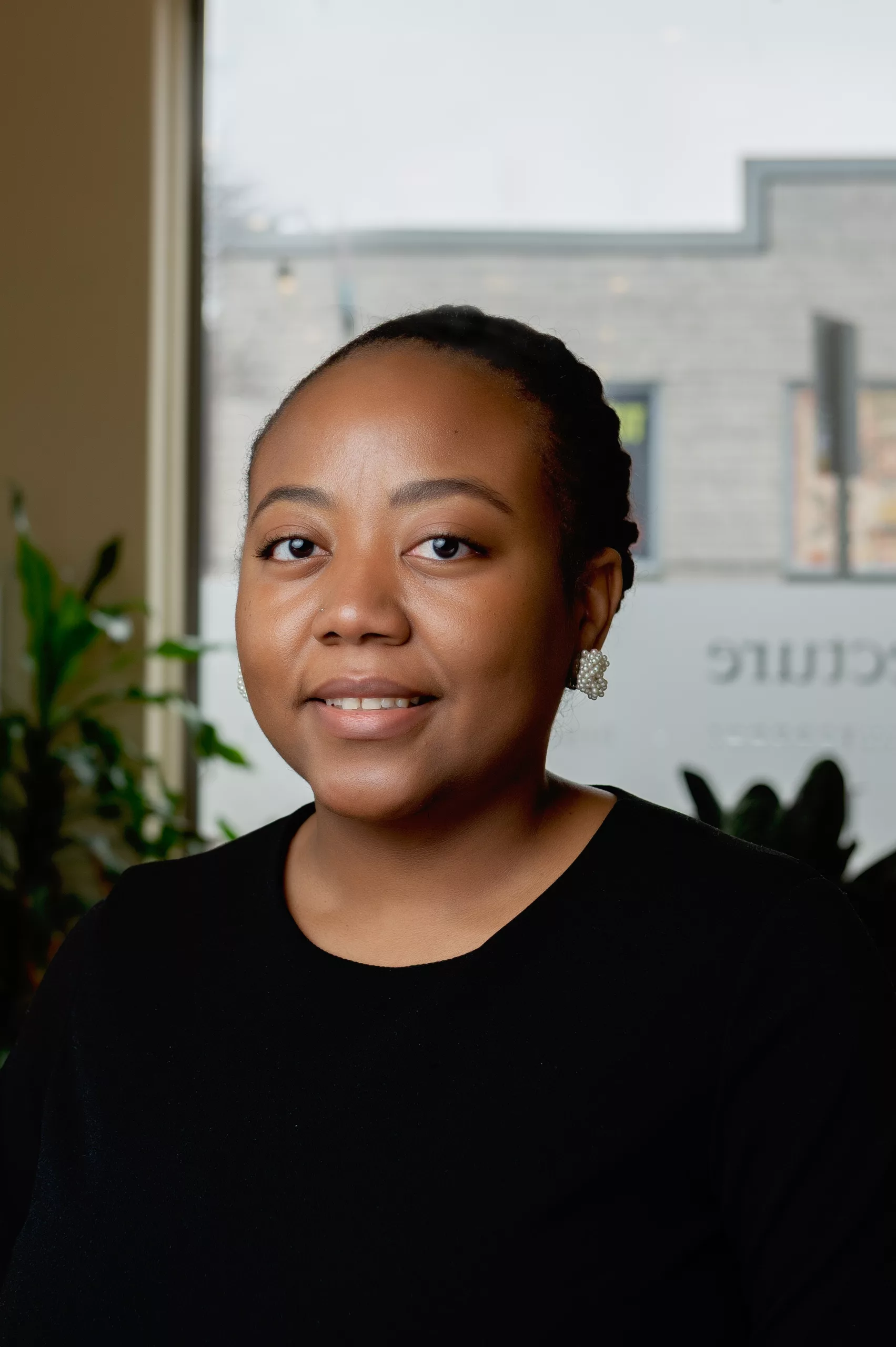
Alexandra Cenatus
Alexandra Cenatus is a Ph.D. student at the University of Maryland, Baltimore County and also serves as the Director of Programs at Maryland Humanities, where she works to make the humanities accessible and engaging for diverse audiences. Her doctoral research investigates the intersection of Haiti’s evolving social landscape and its influence on Haitian foodways. Through her role at Maryland Humanities, Cenatus develops and evaluates inclusive programming and promotes language accessibility via workshops, panel discussions, and exhibitions. She co-authored the Haitian American Dream Timeline in 2021 alongside collaborators Margarita Vargas-Betancourt and Ivanna Moreno, a digital humanities initiative that chronicles the historical trajectory of Haitian immigration to the United States. Cenatus actively contributes her research and programming expertise to community initiatives through her service on the Maryland 250 Commission and her board positions with the Haitian Studies Association (HSA), WeaveTales, and the Washington State Coalition for Language Access (WASCLA).
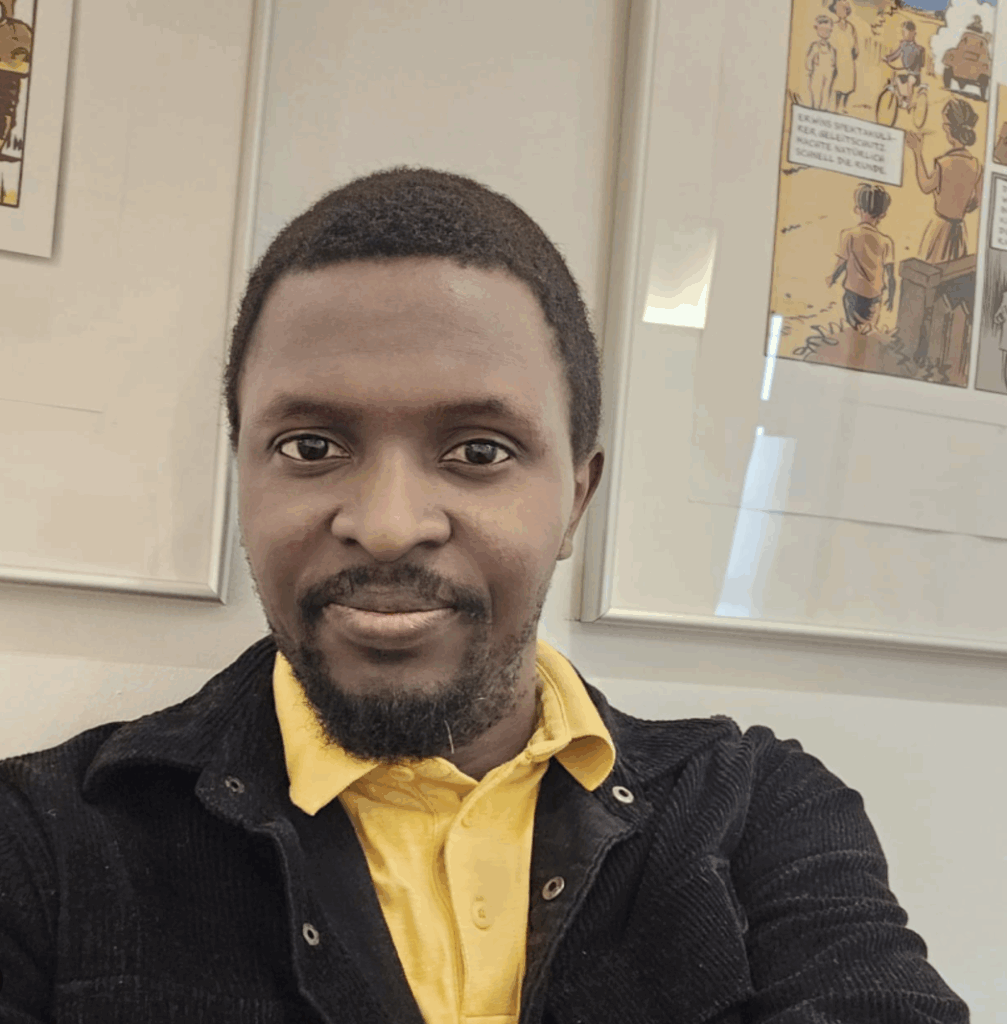
James Yékú
James Yékú, a recipient of the Alexander von Humboldt fellowship, is an associate professor of African digital humanities at the University of Kansas. He is the author of two monographs—Cultural Netizenship: Social Media, Popular Culture, and Performance in Nigeria, and The Algorithmic Age of Personality: African Literature and Cancel Culture—and two poetry volumes, as well as a collection of nonfiction essays. Yékú spearheads African DH programming at the University of Kansas and also co-organizes the annual African DH symposium.
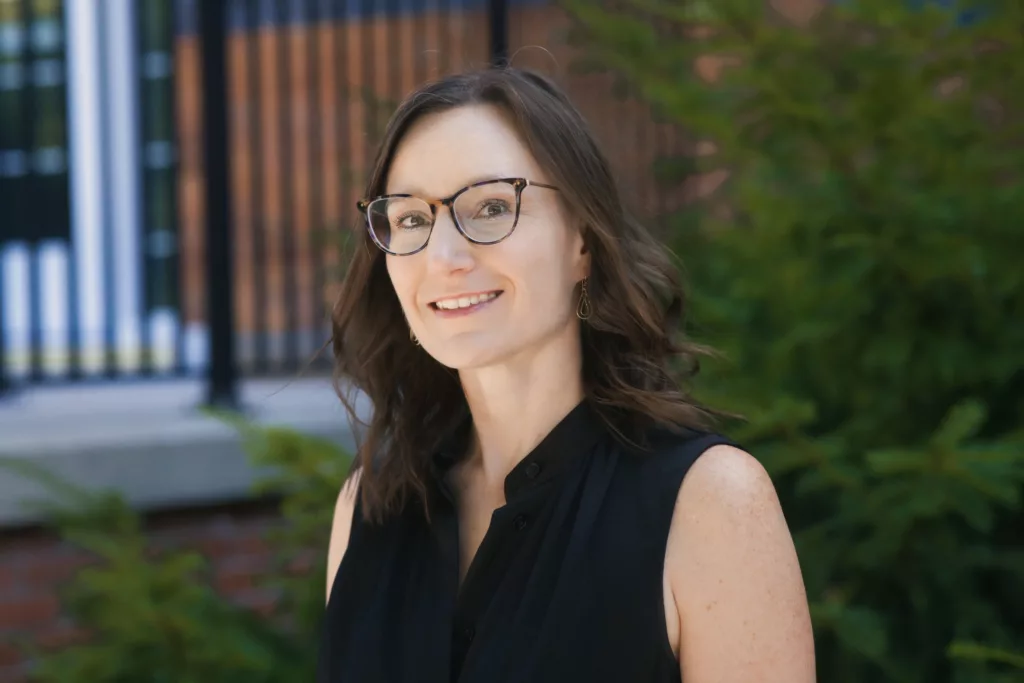
Kristen Mapes
Kristen Mapes is the Interim Director of Digital Humanities at Michigan State University where she bring together DH scholars and students from across units, create pathways to doing DH, and amplify digital work to range of publics. She regularly teaches the introductory Digital Humanities graduate and undergraduate courses and leads the digital humanities study abroad program, Digital Culture in London and Scotland. Kristen co-Chairs the Global Digital Humanities Symposium and is Chair of the Executive Board of the Association of Digital Humanities Associations (ADHO). Her work can be found in, for example, the Social Justice in the Digital Humanities #dariahTeach course, Reviews in Digital Humanities, and the Routledge Handbook of Digital Humanities Methods. She holds graduate degrees in Library and Information Science from Rutgers University and Medieval Studies from Fordham University.